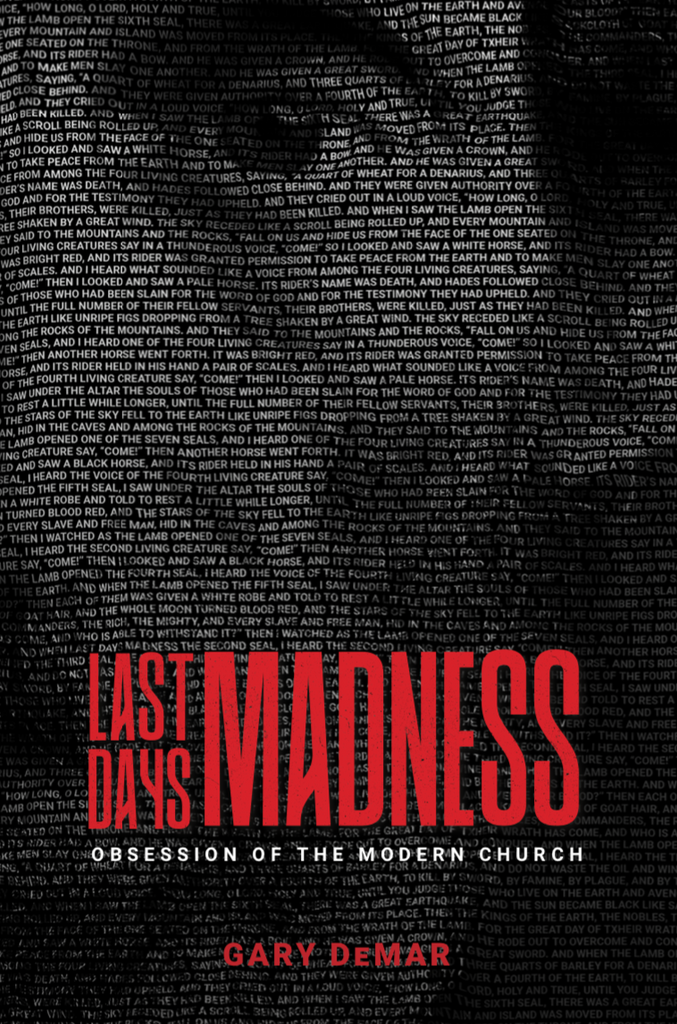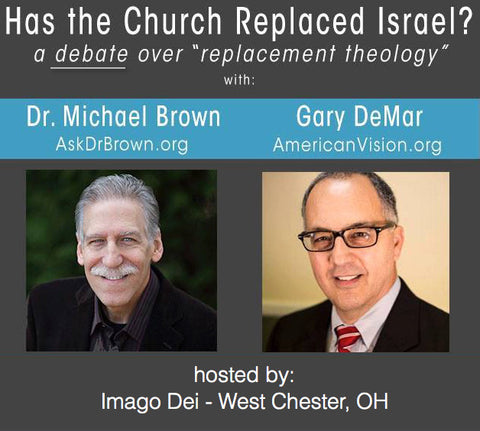There’s a great deal of confusion today regarding the last days and the role that Israel is said to play. I hope the following will clear up some of the mischaracterizations of Israel and the last days.
Are we to believe that one last-days generation will be grafted into the olive tree mentioned by the Apostle Paul in Romans 11 after 2000 years, and that’s what Paul means when he wrote that “all Israel will be saved”? Is that what Paul was describing in Romans 11:26? Absolutely not. David Jeremiah has called for Christians to pray for the peace of Jerusalem. I suggest we should pray for peace everywhere, including where Christians are being slaughtered in other parts of the world. For example:
Nigeria led the world in Christians killed for their faith in 2022, with 5,014, according to Open Doors’ 2023 World Watch List (WWL) report. It also led the world in Christians abducted (4,726), sexually assaulted or harassed, forcibly married or physically or mentally abused, and it had the most homes and businesses attacked for faith-based reasons. As in the previous year, Nigeria had the second most church attacks and internally displaced people.
At the same time much of the Christian world is horrified at what happened to Israel, the prophecy position David Jeremiah and other prominent prophecy professionals teach is that two-thirds of Jews living in Israel during the Great Tribulation will be slaughtered. I’ll be doing a podcast and article on this topic in the next week. The church today is being misled when it comes to Bible prophecy, and it’s becoming even more dangerous.

Last Days Madness
In this authoritative book, Gary DeMar clears the haze of "end-times" fever, shedding light on the most difficult and studied prophetic passages in the Bible, including Daniel 7:13-14; 9:24-27; Matt. 16:27-28; 24-25; Thess. 2; 2 Peter 3:3-13, and clearly explaining a host of other controversial topics.
Buy NowIsraelites were being grafted into the body of Christ in Paul’s day, by the tens of thousands! It’s called “the remnant”: “There has also come to be AT THE PRESENT TIME [Paul’s time] a remnant according to God’s gracious choice.” Consider the TIMING and the CONTEXT:
I say then, God has not rejected His people, has He? Far from it! For I too am an Israelite, a descendant of Abraham, of the tribe of Benjamin. God has not rejected His people whom He foreknew. Or do you not know what the Scripture says in the passage about Elijah, how he pleads with God against Israel? “Lord, THEY HAVE KILLED YOUR PROPHETS, THEY HAVE TORN DOWN YOUR ALTARS, AND I ALONE AM LEFT, AND THEY ARE SEEKING MY LIFE.” But what is the divine response to him? “I HAVE KEPT for Myself SEVEN THOUSAND MEN WHO HAVE NOT BOWED THE KNEE TO BAAL.” In the same way then, there has also come to be at the present time a remnant according to God’s gracious choice. But if it is by grace, it is no longer on the basis of works, since otherwise grace is no longer grace.
The gospel had been preached to Jews around the known world at that time (Rom. 1:8; Col. 1:6, 23; 1 Tim. 3:16; Rom. 16:25-27). “To the Jew first” predominates in Scripture: “For I am not ashamed of the gospel, for it is the power of God for salvation to everyone who believes, to the Jew first and also to the Greek” (Rom. 1:16; 2:9-10). We see this early in the Apostolic era: “Now there were Jews living in Jerusalem, devout men, from every nation under heaven” (Acts 2:5). The promises that had been made to Israel were being fulfilled in the events of Pentecost and beyond:
“Now when they heard this, they were pierced to the heart, and said to Peter and the rest of the apostles, ‘Brethren, what shall we do?’ Peter said to them, ‘Repent, and each of you be baptized in the name of Jesus Christ for the forgiveness of your sins; and you will receive the gift of the Holy Spirit. ‘For the promise is for you and your children and for all who are far off, as many as the Lord our God will call to Himself.’ And with many other words he solemnly testified and kept on exhorting them, saying, ‘Be saved from this perverse generation!’ So then, those who had received his word were baptized; and that day there were added about three thousand souls. They were continually devoting themselves to the apostles’ teaching and to fellowship, to the breaking of bread and to prayer. Everyone kept feeling a sense of awe; and many wonders and signs were taking place through the apostles. And all those who had believed were together and had all things in common; and they began selling their property and possessions and were sharing them with all, as anyone might have need. Day by day continuing with one mind in the temple, and breaking bread from house to house, they were taking their meals together with gladness and sincerity of heart, praising God and having favor with all the people. And the Lord was adding to their number day by day those who were being saved” (Acts 2:37-47).
Peter’s message was to “all the house of Israel” (Acts 2:36; see Matt. 10:6, 23; 15:24). When these Israelites asked, “Brethren, what shall we do?” (2:37), Peter told them: “For the promise is for you and your children, and for all who are far off [James 1:1; 1 Peter 1:1], as many as the Lord God shall call to Himself” (2:39).
Israel’s spiritual destiny is the same as it is for non-Israelites: Repent and believe in Jesus! It’s “to the Jew first,” but not to Jews only (Rom. 1:16; 2:9; Matt. 10:5-6; 15:24; John 4:22; Acts 3:26). When the gospel goes to the Gentiles, it does not mean that Jews no longer matter. We’re all in the same redemptive boat.
The NT does not say anything about a delay in the promises that had been made to Israel centuries before. In fact, Peter clearly informed his audience that the promises were for them and their children (Acts 2:38). There is no mention of the land, a rebuilt temple, the reinstitution of animal sacrifices, or anything else related to the shadows of the Old Covenant: “And coming to Him as to a living stone which has been rejected by men, but is choice and precious in the sight of God, you also, as living stones, are being built up as a spiritual house for a holy priesthood, to offer up spiritual sacrifices acceptable to God through Jesus Christ” (1 Peter 2:4-5). In fact, “for all who were owners of land or houses” sold them (4:34). They possessed something better, the forgiveness of their sins (2:38) and a better inheritance (Heb. 11:8-16)—the world! Jesus is “the mediator of a better covenant, which has been enacted on better promises” (8:6). What would they rather have, land, a stone temple, the cutting of their flesh, and yearly bloody sacrifices, or forgiveness of sins, a sinless priesthood, the power of the Holy Spirit (Acts 1:8), and Jesus who intercedes as a mediator for them daily? The answer is obvious as the book of Hebrews makes clear in multiple chapters.
A Jewish Church
The first church was made up exclusively of Jews (Acts 5:11; 8:1-3; 9:31). As anyone can see, there is nothing said or indicated that the church replaced Israel since Israel was the church, just like Israel had been the church under the Old Covenant (see 7:38: “the ekklēsia in the wilderness”). The Hebrew word qahal (congregation or assembly) is translated as ekklēsia in the Greek translation of the Old Testament called the Septuagint (LXX).
In fact, Dr. Michael Brown agrees with this assessment:
Let’s go back to the Book of Acts. The early Church was exclusively Jewish. It was almost ten years before a group of Gentiles received the gospel, and this created shock waves in Jerusalem.[1]
God kept His promise to Israel by sending His only begotten Son. As the above passages show, God did not reject His people. Jews were being saved by the thousands throughout the known world (Acts 21:20). At the same time, there were Jews who were rejecting Jesus as the promised redeemer. Consider the following from Acts 13:46-52:
But when the Jews saw the crowds, they were filled with jealousy [see Rom. 10:19; 11:11, 14; Acts 5:17] and began to oppose what Paul was saying by insulting him. Then Paul and Barnabas boldly said: “It was necessary that God’s message be spoken to you first. But since you reject it and consider yourselves unworthy of eternal life, we now turn to the Gentiles! For this is what the Lord has commanded us: ‘I have made you a light for the Gentiles to bring salvation to the ends of the earth.’” When the Gentiles heard this, they rejoiced and glorified the message of the Lord, and all who had been appointed to eternal life believed. So the message of the Lord spread through the whole region. But the Jews incited the prominent women, who worshiped God, and the leading men of the city. They stirred up persecution against Paul and Barnabas and expelled them from their district. But they shook the dust off their feet against them and went to Iconium. And the disciples were filled with joy and the Holy Spirit.”
This passage is in keeping with all we see in the New Testament. The Jews were the first to hear the gospel (Matt. 10:5-6). The Jews were the first to believe. The Jews were the first to make up the New Covenant church (ekklēsia). When the gospel went to the Gentiles (nations), these non-Jews did not replace Israel. The Gentiles were grafted into an already growing New Testament assembly of believers made up of those from “the house of Israel.” These truths are fundamental to New Testament theology.
The Gentiles Also
The first Christians were Jews. The gospel was preached to “Israel” (Acts 2:22, 26). We later learn that the gospel extended “also to the Greek” (Rom. 1:16; Acts 3:26; Rom 2:9) as Peter’s encounter with Cornelius shows (Acts 10). Notice Peter’s evaluation of these events and the response of his fellow Jews:
“And as I began to speak, the Holy Spirit fell upon them just as He did upon us at the beginning. And I remembered the word of the Lord, how He used to say, ‘John baptized with water, but you will be baptized with the Holy Spirit.’ Therefore if God gave to them the same gift as He gave to us also after believing in the Lord Jesus Christ, who was I that I could stand in God’s way?” When they heard this, they quieted down and glorified God, saying, “Well then, God has granted to the Gentiles [lit. nations] also the repentance that leads to life” (Acts 11:15-18).
“The Gentiles also.” Gentile believers were grafted into the Jewish assembly of believers and were given “the same gift,” the Holy Spirit (see Acts 1:8; 2:38). Jews and Gentiles together making “the two into one new man” (Eph. 2:15) made up the “congregation of God.”
The charge of “Replacement theology” obscures the obvious. The charge is a tactical red herring to get people’s attention away from what the New Testament shows about the relationship between the promises of the Old Covenant and their fulfillment in the New Covenant with Israel and how Gentiles are grafted into an Israelite assembly (ekklēsia) of believers.
How in any way is this even close to a replacement? It’s not. Dispensationalism has established a false Israel-Church distinction that leads to the claim that anyone who is not a dispensational premillennialist is either anti-Semitic or, to use a less pejorative term, “anti-Judaism.” A quick reading of the New Testament will show that no one makes the case that there is a church-Israel distinction. There are Jews and Gentiles, but there is one people of God. There aren’t two olive trees: there’s one olive tree (Rom. 11:17-24). Modern Judaism and Islam are anti-Christian. They reject Jesus as the Messiah!

Has the Church Replaced Israel?
The stated topic of debate is "Has the Church replaced Israel?" The topic is a springboard for discussion of the dispute between two general modern positions: one which sees important Old Testament promises as pertaining specially and only to ethnic Israel, and another in which those promises to all believers—i.e. "the church."
Buy NowThis is why I find this statement by Dr. Brown disingenuous since there are many within his own prophetic camp that hold prophetic views that contribute to indifference when it comes to the Jews:
If the Church is spiritual Israel, and the new Israel, then there is no need for natural Israel, the old Israel anymore. “Let them rot for all we care! They’ve lost the blessing forever. They crucified the Messiah. They blew their opportunity. In fact, they still don’t believe their own Scriptures. They are no longer the covenant people. We are!”[2]
Individual Jews like individual Gentiles have not lost the blessings of the gospel forever. Jews and non-Jews at this very moment can embrace Jesus as their savior. Dr. Brown is a perfect example of this truth! There were believing and unbelieving Jews and Gentiles in Jesus’ day, and there are believing and unbelieving Jews and non-Jews today. National status doesn’t have anything to do with being in or out of Christ. Just like the temple never saved anyone; national restoration of Israel won’t save anyone. This is especially true when it comes to how dispensationalists and other premillennialists believe about what happens to Israel in this supposed final prophetic generation, what Hal Lindsey described as “the terminal generation.”
[1] Brown, Our Hands Are Stained with Blood: The Tragic Story of the Church and the Jewish People (Destiny Image Incorporated (1992), chap. 8.
[2] Brown, Our Hands are Stained with Blood, chap. 13.

